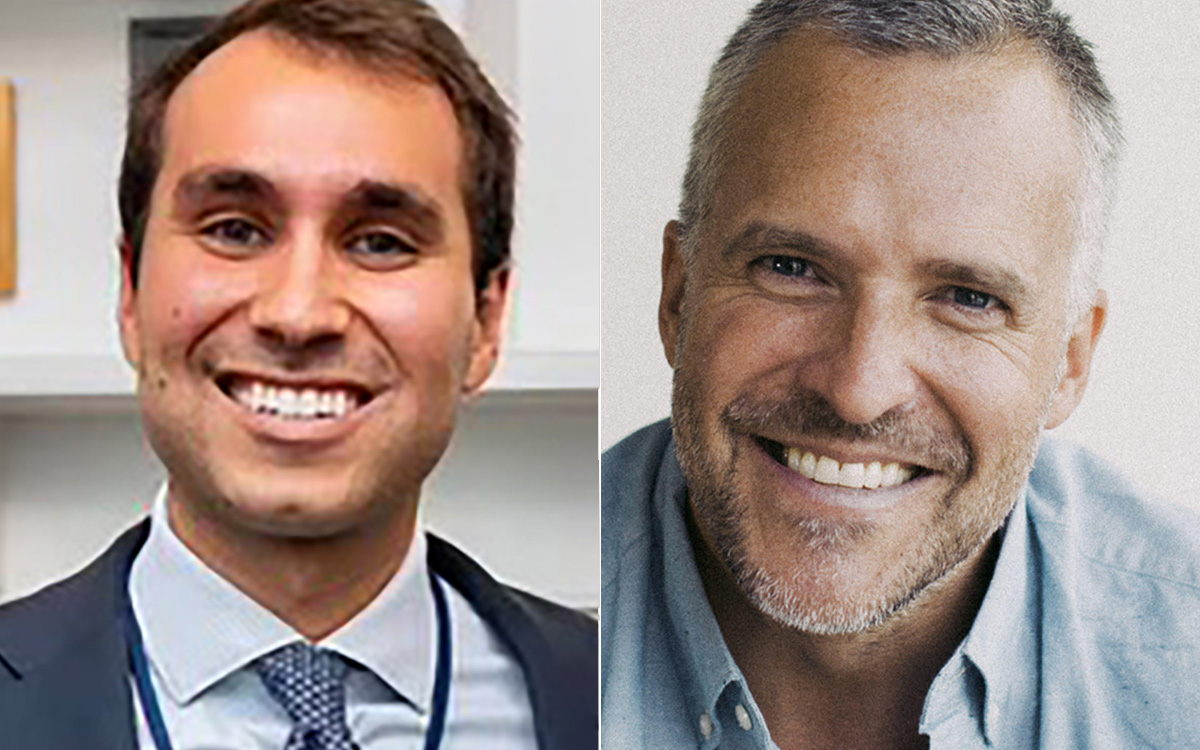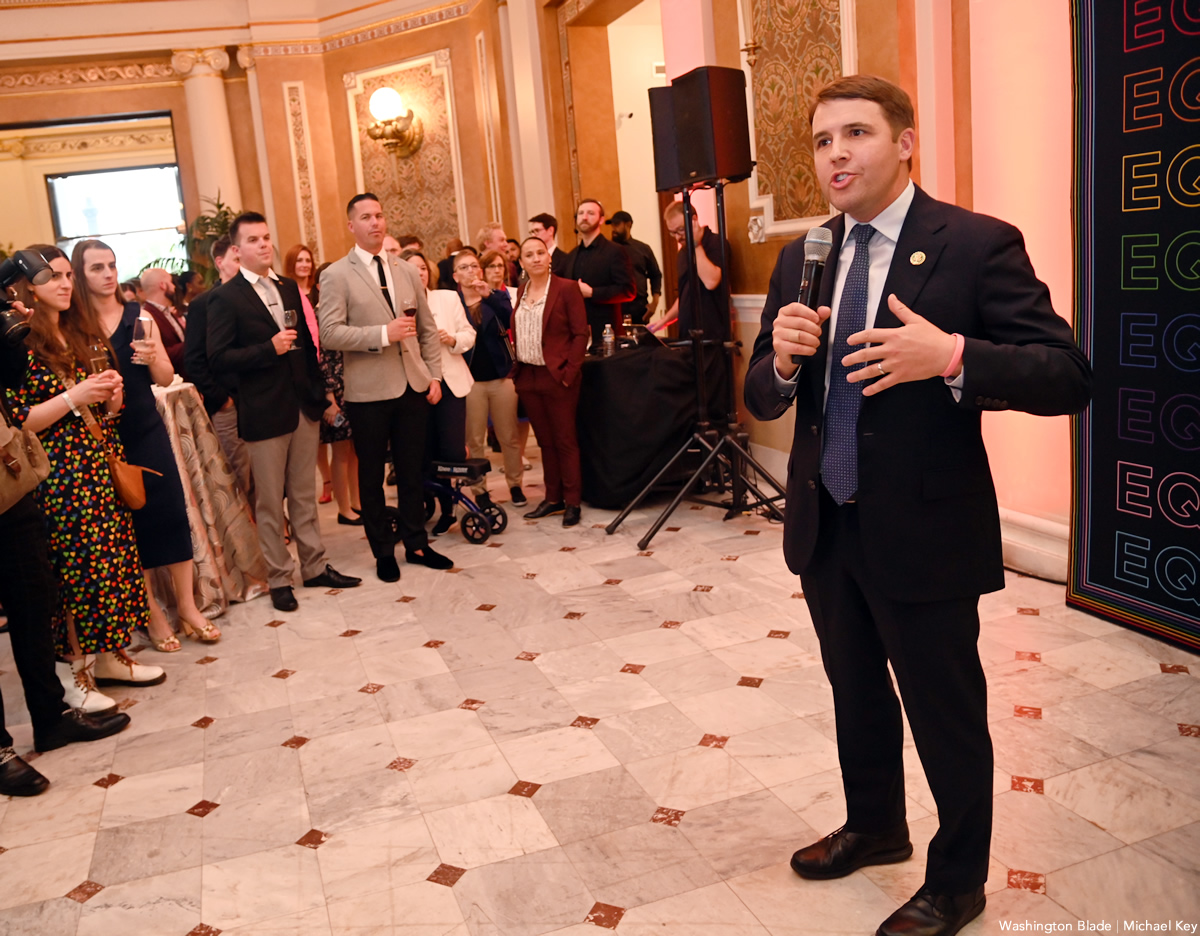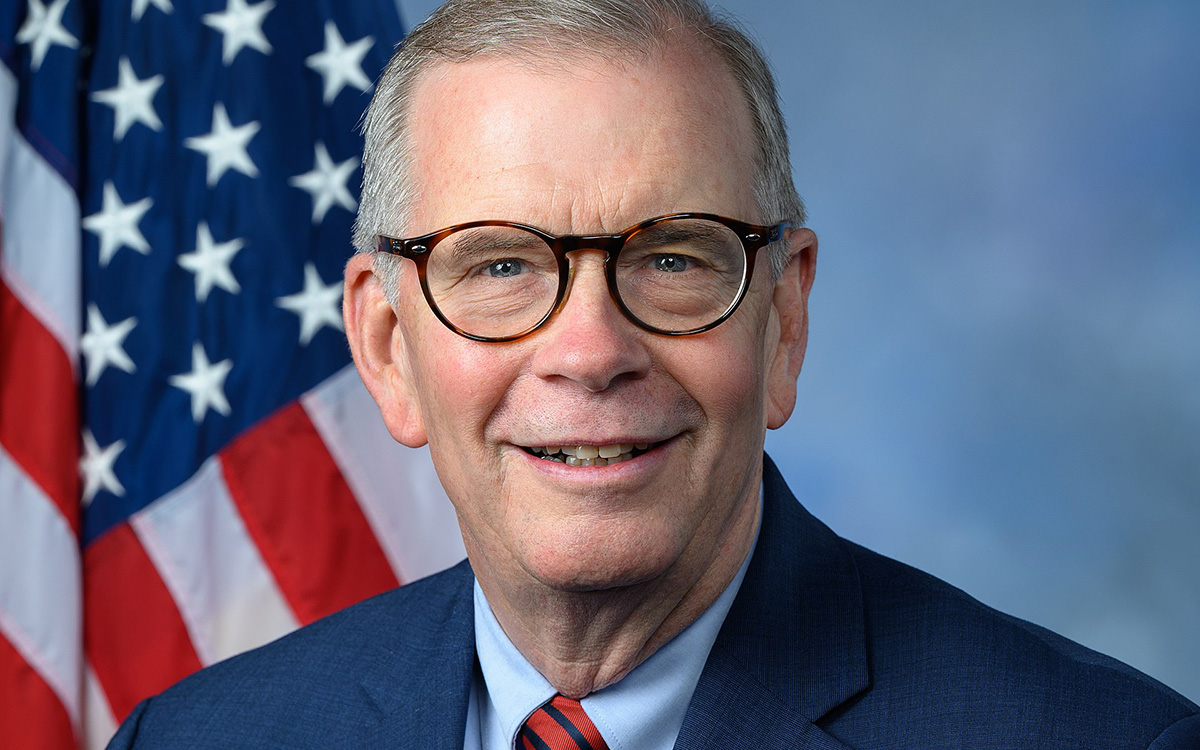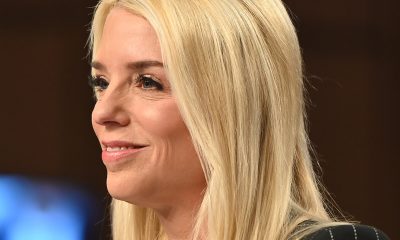Politics
EXCLUSIVE: Meet the LGBTQ staff working on Biden’s re-election campaign
Munoz, Gifford view 2024 as existentially important

(Editor’s note: This is the first in a three-part series profiling senior LGBTQ staff working on President Biden’s re-election campaign. Part two will be published next week.)
The Biden-Harris administration has made history with the number and seniority of its LGBTQ appointees — a fact that is perhaps almost as familiar as the faces of America’s first openly gay Cabinet-level official, Transportation Secretary Pete Buttigieg, or Karine Jean-Pierre, who is both the first Black woman and the first lesbian White House press secretary.
Queer people are also helping to lead the largely behind-the-scenes, grueling reelection effort, and last week the Washington Blade spoke with five of them at the campaign’s headquarters in Wilmington, Del., and another remotely over Zoom.
The campaign’s spokesperson Kevin Munoz and finance chair Rufus Gifford, both gay men, view next year’s election and its stakes for LGBTQ Americans, for all Americans, as existentially important.
So, too, do the staff who will be profiled in Parts 2 and 3 of this series: Sergio Gonzales, senior adviser to Vice President Kamala Harris; Rubi Flores, special assistant to campaign manager Julie Chávez Rodríguez; Becca Siegel, senior adviser to the campaign; and Teresa Tolliver, director of operations for the campaign.
Each brings diversity with respect to both identity and experience to their roles.
“I entered politics as someone that had worked in advertising,” Munoz told the Blade.
Joining the Biden for President campaign in 2019 as the Nevada press secretary without much experience liaising with reporters or drafting press releases, Munoz said he promised to “work like the Dickens on the things that I [didn’t] know enough about.”
After joining team Biden in Las Vegas, he would go on to serve as an assistant White House press secretary, working on critically important matters, including the administration’s response to COVID and other public health crises, before joining the campaign last March.
Throughout, Munoz said, “There’s never been an environment in which I haven’t felt really comfortable to be myself and really able to use my background, as someone from Florida, as a Latino, as a gay man, to my advantage and to be able to speak about issues that uniquely impact me or people like me.”
“When I was at the White House,” he said, “I had the opportunity to work on LGBT issues as it relates to health care,” including with the emergence of mpox, which “was uniquely impacting” gay men.
Munoz remembers that as the National Security Council — which is responsible for handling outbreaks of disease at their early outset — held a briefing, “I said to some colleagues and the powers that be, this guy is going to be the guy that is able to talk candidly and be credible and trusted, and also talk about all the wonky public health things all at once.'”
He was referring to Dr. Demetre Daskalakis, who was director of the Division of HIV/AIDS Prevention at the Centers for Disease Control and Prevention before the White House named him deputy coordinator of the national mpox response in 2022 — a move that, Munoz said, demonstrated that the administration “understands the need to have LGBTQ people at the table and really leading the response on something like this.”
Munoz is also from Florida. In March, “We had to lead the response when ‘Don’t Say Gay’ was just becoming an issue,” he said, during which time the bill was signed into law by the state’s Republican Gov. Ron DeSantis, now a presidential candidate.
“I remember being with Jen [Psaki], in the Press Secretary’s office, when this was coming out and we started talking about this early on, about how this is an issue of freedom,” he said. “They want to tell you who you can be.”
The controversial law prohibits classroom discussion of sexual orientation or gender identity in Florida’s public schools, potentially penalizing teachers who might, for example, display a photo of their same-sex spouse on their desk.
In the campaign, Munoz said his experience in advertising became an asset, too. With the challenges stemming from the fragmented media environment, where voters get their information from places like Snapchat and WhatsApp, Munoz said, “I’m very grateful to have come from a background where I was doing message testing and ad testing and ad recall.”
“We need to build a bench of different places that we can go and tap into, to talk about Joe Biden’s message” and “how he’s delivering,” he said, so there is a built-in advantage because “I’m not starting from ground zero.”
“When your life is on the line, you’re gonna fight like your life is on the line,” he said, noting how, leading into next year’s elections, “virtually every state attorney general in Republican states is attacking trans Americans.”
The importance of centering voices whom voters can trust and identify with extends to outreach to LGBTQ voters, too, Munoz said, noting that the community constitutes “a huge voting bloc in our battleground states.”
From the campaign’s perspective, this means continuous year-round outreach to Black communities, younger people, the LGBTQ community, and other stakeholders, he said, adding that “when we start to do more coalition specific work directly from the campaign as the general election is built out,” this will likely mean a revival of the 2020 Out for Biden campaign.
Likewise, speaking with the Blade by Zoom from his home in Boston, Gifford said that “a critically important part of the Biden Harris victory next year is engaging the LGBT community across the board.”
“Not only are we going to be an extremely important fundraising piece of this puzzle,” he said, “but look: These states, I mean, if you think about the margins in ’20 — 10,000 votes, 20,000 votes in some of these states — the LGBT community can flip a state.”
A large part of Gifford’s work, both now and in previous roles, involves dealing with people. “I’m very out and I’m very proud,” he said. “I will never lie about who I am,” he said.
Gifford said he has been out for 30 years, during which time he worked on a total of five presidential campaigns, beginning with John Kerry’s in 2004 and then Barack Obama’s in 2008 and 2012, and then Joe Biden’s in 2020 and, now, 2024.
From 2013 to 2017, he served as U.S. ambassador to Denmark, and then from 2022 to the start of his work on the campaign this year, he was chief of protocol of the U.S., an officer position with the rank of ambassador and assistant secretary of state.
“I worked for Barack Obama for 10 years,” Gifford said, but the Biden-Harris administration “is the most pro-LGBT administration in the history of the United States of America.”
“I think being gay is inherently political — I mean, it has to be,” he said. “You know, people have politicized our lives. People have politicized our love lives; they’ve politicized our sex lives; they’ve politicized everything about us.”
Gifford was a young man when the U.S. Senate rejected Jim Hormel’s nomination by President Clinton to be U.S. ambassador to Luxembourg, before he went on to serve in that role as a recess appointment.
At the time, he said the ordeal foreclosed, in his mind, the possibility of following in Hormel’s footsteps.
After his unanimous Senate confirmation to serve as ambassador to Denmark, as “one of the first openly gay ambassadors appointed” to serve in “a very progressive country,” Gifford said, “I was shocked by how much people cared” about the significance of his being an out gay man.
“It was just a couple years before I showed up in Copenhagen, that the Bush administration was pushing a constitutional amendment to ban marriage equality,” he said. “And there was the American ambassador getting married to his husband at the U.S. ambassador’s residence literally just a few years later.”
As chief of protocol with the State Department, Gifford said that in many cases, “I was the guy at the bottom of the staircase, greeting, at Andrews Air Force Base, the leader of a country that criminalized homosexuality.”
This was part of the job, he said, “whether I agree with them or not, or whether Joe Biden agrees with them or not — but I was doing it as an openly gay man,” a fact about which these foreign leaders, all of whom “well briefed and well-staffed” were certainly aware.
“Politics is about choices,” Gifford said. “And for our community, to look at the choices, it’s just so damn clear.”
The stakes, again, are very real. “Mike Johnson, the new Speaker of the House, introduced a federal ‘Don’t Say Gay’ bill,” he noted. “You don’t think Donald Trump would sign that bill in a second if they could get that through the Senate and the House? This is what we’re up against. This is what we’re dealing with.”
Congress
Goodlander endorses Pappas’s Senate bid
Announcement puts gay congressman on the path to securing his party’s nomination

U.S. Rep. Maggie Goodlander (D-N.H.) on Thursday announced she will not run to represent her state in the U.S. Senate, endorsing gay U.S. Rep. Chris Pappas’s (D-N.H.) bid for the seat of retiring U.S. Sen. Jeanne Shaheen, putting him on the path to secure the Democratic nomination.
“We are in the fight of our lifetimes right now, of a moment of real crisis and challenge,” she said. “I feel humbled and grateful to so many people across our state who have encouraged me to take a look at the U.S. Senate, and after a lot of thought and conversations with people I love and people I respect and people who I had never met before, who I work for in this role right now, I’ve decided that I’m running for re election in the House of Representatives.”
When asked by a reporter from the ABC affiliate station in New Hampshire whether she would endorse Pappas, Goodlander said, “Yes. Chris Pappas has been amazing partner to me in this work and for many years. And I really admire him. I have a lot of confidence in him.”
She continued, “He and I come to this work, I think with a similar set of values, we also have really similar family stories. Our families both came to New Hampshire over 100 years ago from the very same part of northern Greece. And the values that he brings to this work are ones that that I really, really admire. So I’m proud to support him, and I’m really excited to be working with him right now because we’ve got a lot of work to do.”
Today in Salem @MaggieG603 tells @WMUR9 she is not running for U.S. Senate & endorses @ChrisPappasNH #NHPolitics #NHSen #NH02 #WMUR pic.twitter.com/W2CMrhRuIC
— Adam Sexton (@AdamSextonWMUR) April 17, 2025
“Maggie Goodlander has dedicated her career to service, and we can always count on her to stand up to powerful interests and put people first,” Pappas said in a post on X. “I’m so grateful to call her my friend and teammate, and I’m proud to support her re-election and stand with her in the fights ahead.”
Earlier this month, former New Hampshire Gov. Chris Sununu, a Republican, announced he would not enter the Senate race, strengthening the odds that Democrats will retain control of Shaheen’s seat.
Congress
EXCLUSIVE: Garcia demands answers on deportation of gay Venezuelan asylum seeker
Congressman’s correspondence was shared exclusively with the Blade

U.S. Rep. Robert Garcia (D-Calif.) is demanding answers from the Trump-Vance administration on its deportation of Andry Hernández Romero, a gay Venezuelan makeup artist who was sent to a prison in El Salvador in violation of a federal court order and in the absence of credible evidence supporting the government’s claims about his affiliation with a criminal gang.
Copies of letters the congressman issued on Thursday to Immigration and Customs Enforcement and CoreCivic, a private prison contractor, were shared exclusively with the Washington Blade.
Garcia noted that Hernández, who sought asylum from persecution in Venezuela over his sexual orientation and political beliefs, had entered the U.S. legally, passed a preliminary screening, and had no criminal record.
Pro-bono lawyers representing Hernández during his detention in the U.S. pending an outcome in his asylum case were informed that their client had been removed to El Salvador a week after he failed to show for a hearing on March 13.
Hernández’s family now fears for his safety while he remains in El Salvador’s Terrorism Confinement Center (CECOT), which has a well documented record of human rights abuses, Garcia said.
Additionally, the congressman wrote, while experts say Tren de Aragua does not use tattoos as identifiers, the “primary evidence” supporting Hernández’s deportation based on his supposed links to the transnational Venezuelan gang “appears to have been two crown tattoos labeled ‘Mom’ and ‘Dad,’ which are common cultural symbols in his hometown.”
The determination about his links to or membership in the organization was made by a CoreCivic employee whose criminal record and misconduct as a law enforcement officer led to his termination from the Milwaukee Police Department, Garcia wrote in his letter to the company.
Requesting a response by May 1, the congressman asked CoreCivic President Damon T. Hininger to address the following questions:
- What qualifications and training does CoreCivic require for employees tasked with making determinations about detainees’ affiliations?
- What protocols are in place to ensure that determinations of gang affiliation are based on credible and corroborated evidence?
- How does CoreCivic oversee and review the decisions made by its employees in such critical matters?
- What mechanisms exist to prevent and address potential misconduct?
- What is the nature of CoreCivic’s collaboration with ICE in making determinations that affect deportation decisions? Are there joint review processes?
- What background checks and ongoing assessments are conducted for employees involved in detainee evaluations, particularly those with prior law enforcement experience?
- What guidelines does CoreCivic follow regarding the use of tattoos as indicators of gang affiliation, and how does the company ensure that cultural or personal tattoos are not misinterpreted?
In his letter to Tae D. Johnson, acting director of ICE, Garcia requested answers to the following questions by May 1:
- Did ICE personnel independently review and approve the determination made by CoreCivic employee Charles Cross Jr. identifying Mr. Hernández Romero as a member of the Tren de Aragua gang?
- What evidence, beyond Mr. Hernández Romero’s tattoos, was used to substantiate the claim of gang affiliation?
- Under what legal authority are private contractors like CoreCivic permitted to make determinations that directly impact deportation decisions?
- What vetting processes and background checks are in place for contractors involved in such determinations? Are there oversight mechanisms to ensure their credibility and adherence to due process?
- What guidelines does ICE follow regarding the use of tattoos as indicators of gang affiliation, and how does the company ensure that cultural or personal tattoos are not misinterpreted?
Together with U.S. Rep. Maxwell Frost (D-Fla.), Garcia wrote to U.S. Rep. James Comer (R-Ky.) on Tuesday requesting permission to bring a congressional delegation to CECOT for purposes of conducting a welfare check on detainees, expressing specific concern for Hernández’s wellbeing. The congressmen said they would “gladly include any Republican Members of the committee who wish to participate.”
Hernández’s case has drawn fierce criticism of the Trump-Vance administration along with calls for his return to the U.S.
Influential podcaster and Trump ally Joe Rogan spoke out in late March, calling the deportation “horrific” and “a horrible mistake.”
Last week, California Gov. Gavin Newsom (D) sent a letter to Kristi Noem, secretary of the U.S. Homeland Security, which manages ICE, demanding Hernández’s immediate return and raising concerns with the right to due process amid the administration’s crackdown on illegal immigration.
Hernández “was denied the opportunity to defend himself against unsubstantiated allegations of gang involvement or to present his asylum claim,” the governor wrote. “We are not a nation that sends people to be tortured and victimized in a foreign prison for public relations victories.”
Immigrant Defenders Law Center President Lindsay Toczylowski, who is representing Hernández, has not been able to reach her client since his removal from the U.S., she told NBC News San Diego in a report published April 11.
“Under the Constitution, every single person has a right to due process, and that means they have a right to notification of any allegations the government is making against them and a right to go into court and prove that those allegations are wrong if that’s the case,” she said. “In Andry’s case, the government never gave us that opportunity. In fact, they didn’t even bring him to court, and they have forcefully sent him to El Salvador without ever giving us any notice or without telling us the way that we could appeal their decision.”
“CECOT, this prison where no one has ever left, where people are held incommunicado, is a very dangerous place for someone like Andry,” Toczylowski said.
In March, a DHS spokesperson posted on X that Hernández’s “own social media indicates he is a member of Tren de Aragua,” though they did not point to any specific posts and NBC reported that reviews of his known social media accounts turned up no evidence of gang activity.
During a visit to CECOT in March, Time Magazine photographer Philip Holsinger photographed Romero and reported that the detainee plead his innocence — “I’m not a gang member. I’m gay. I’m a stylist.” — crying for his mother as he was slapped and his head was shaved.
Congress
House Republicans advance two anti-trans education bills
Congresswoman Jahana Hayes, LGBTQ groups slammed the effort

Republicans members of the House Education and Workforce Committee advanced two anti-transgender bills on Wednesday, one that would forcibly out students in public elementary and middle schools to their parents and a second covering grades K-12 that critics have dubbed a “don’t say trans” bill.
More specifically, under the PROTECT Kids Act, changes to “a minor’s gender markers, pronouns, or preferred name on any school form or sex-based accommodations, including locker rooms or bathrooms” could not be made without parental consent, while the Say No to Indoctrination Act would prohibit schools from teaching or advancing “gender ideology” as defined by President Donald Trump’s anti-trans Jan. 20 executive order, Defending Women from Gender Ideology Extremism and Restoring Biological Truth to the Federal Government.
U.S. Rep. Jahana Hayes (D-Conn.), who was named national teacher of the year before her election to Congress, rose to speak out against the bills during the committee’s convening on Wednesday.
“Curriculum does not include teaching students to be something else. Curriculum does not include indoctrinating students to identify as gay or LGBTQ or other or anything. But federal law mandates that all students have civil rights protections,” she said.
The congresswoman continued, “I don’t really understand what the members of this committee think happens in schools, but my question is, what do we do with these children? The children who you are saying, on this committee, don’t exist, the children who are struggling with their identity and often times confide in their teachers and ask for support and help.”
“What we’re doing in this committee is focusing on a small population of students who are at a point in their life where they are struggling and school may, for many of them, feel like the only safe place or the only place where they can get support, or the only place where they can speak to a counselor,” Hayes said.
“And as a teacher, I don’t care if it was just one student that I had to reassure that they were important and they were valued and they belonged here,” she said. “I’m going to do it, and anyone who has dedicated their life to this profession will do the same. So the idea that you all feel okay with arbitrarily erasing, disappearing people, making them think that they they don’t exist, or they don’t have a place in schools, or the curriculum should not include them, or whatever they’re feeling should not be valued, considered, Incorporated, is just wrong.”
“So I will not be supporting this piece of legislation, as if that was not already evident, and I will be using all of my time, my agency, my energy, my advocacy, to ensure that every student,” Hayes said, “feels valued, respected, important and included in the work that I engage in on this committee.”
The congresswoman concluded, “when you are in a classroom and you are a teacher, and that door closes and a student falls in your arms and says to you, I am struggling, and I can’t go home with this information, and I need Help, you have a moral responsibility to help that child or you are in the wrong profession. I yield back.”
The Congressional Equality Caucus slammed the bills in an emailed statement from the chair, U.S. Rep. Mark Takano (D-Calif.), who noted that the legislation comes as “Donald Trump is illegally trying to dismantle the Department of Education and pass tax cuts for billionaires.”
“Extreme Republicans in Congress are trying to distract Americans by advancing cruel, anti-trans legislation,” said the congressman, who is gay. “School districts, teachers, and staff best understand how to draft age-appropriate, inclusive curriculums and craft policies that both respect the important role parents play in children’s education and the importance of students’ safety.”
“Yet, Republicans’ Don’t Say Trans Act would cut critical funding for schools if their teachers teach lessons or include materials that simply acknowledge the reality of trans peoples’ existence,” Takano added. “Republicans’ forced outing bill would put kids in danger by requiring schools that want to take certain steps to affirm a transgender student’s identity to forcibly out them to their parents — even if the school knows this will put the student’s safety at risk.”
The caucus also slammed the bills in a series of posts on X.
🚨BAD BILLS ALERT🚨
— Congressional Equality Caucus (@EqualityCaucus) April 9, 2025
Today, the GOP-controlled Education Committee is voting on two anti-trans bills: One to force teachers to out trans students if they want to take certain steps to affirm the students’ identities, and a “Don’t Say Trans” bill.
Here's why we’re opposed: 🧵
The Human Rights Campaign also issued a statement on Wednesday by the organization’s communications director, Laurel Powell:
“Instead of putting our dangerous President in check and tackling the American economy’s free fall, House Republicans showed where their priorities lie — giving airtime to junk science and trying to pass more anti-LGBTQ+ legislation.
“Forcing teachers to ‘out’ trans youth rather than supporting them in coming out to their families and demanding that schools ignore the trans students who sit in their classrooms is a craven attempt to distract people from economic disaster by vilifying children.
“Even as they fire people whose jobs were to make sure schools have the resources they need, the Trump administration and their allies in Congress continue to attack vulnerable young people to score points with the far right.”
-

 State Department4 days ago
State Department4 days agoHIV/AIDS activists protest at State Department, demand full PEPFAR funding restoration
-

 Brazil4 days ago
Brazil4 days agoUS lists transgender Brazilian congresswoman’s gender as ‘male’ on visa
-

 Federal Government5 days ago
Federal Government5 days agoWhite House sues Maine for refusing to comply with trans athlete ban
-

 District of Columbia4 days ago
District of Columbia4 days agoCapital Pride wins $900,000 D.C. grant to support WorldPride












